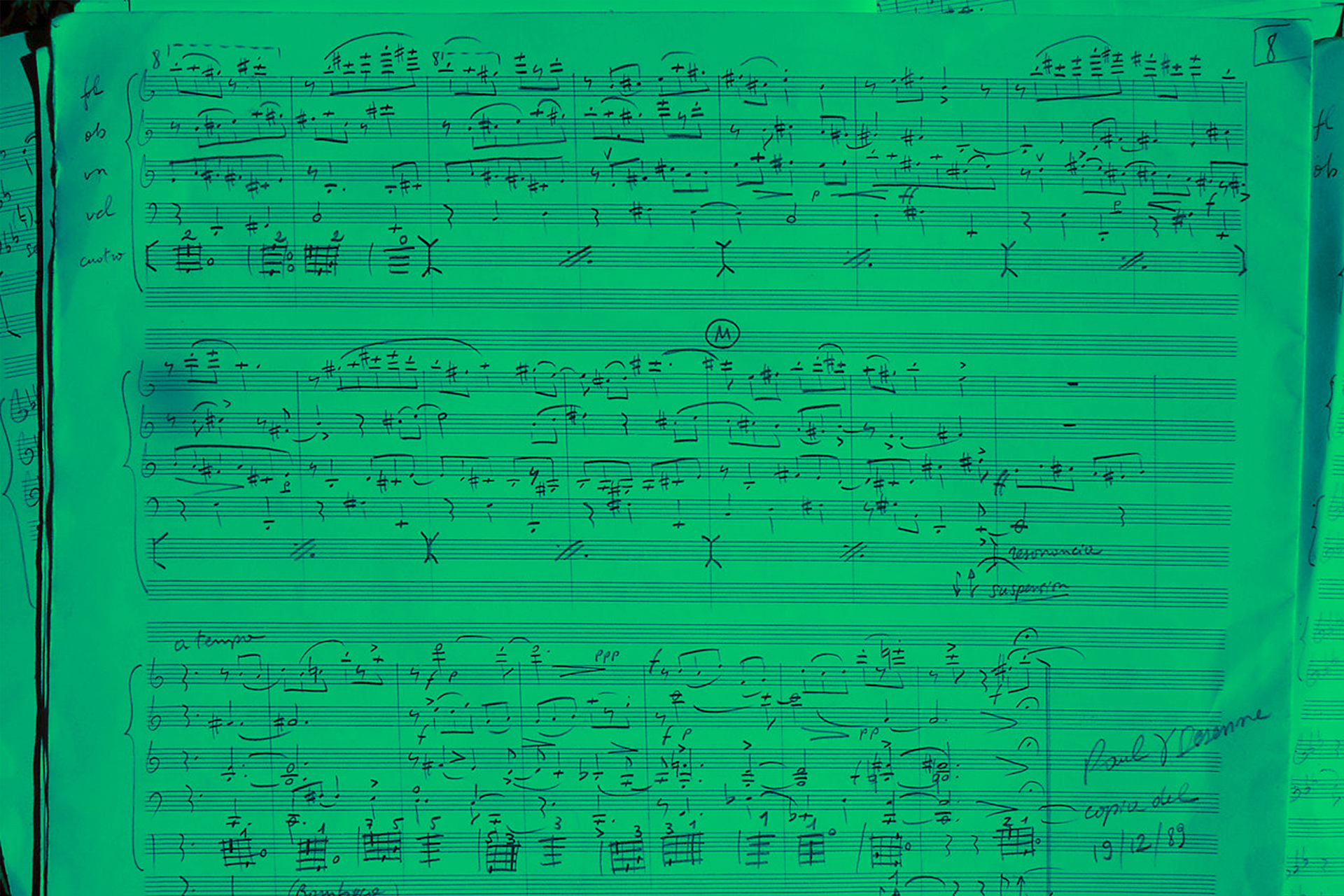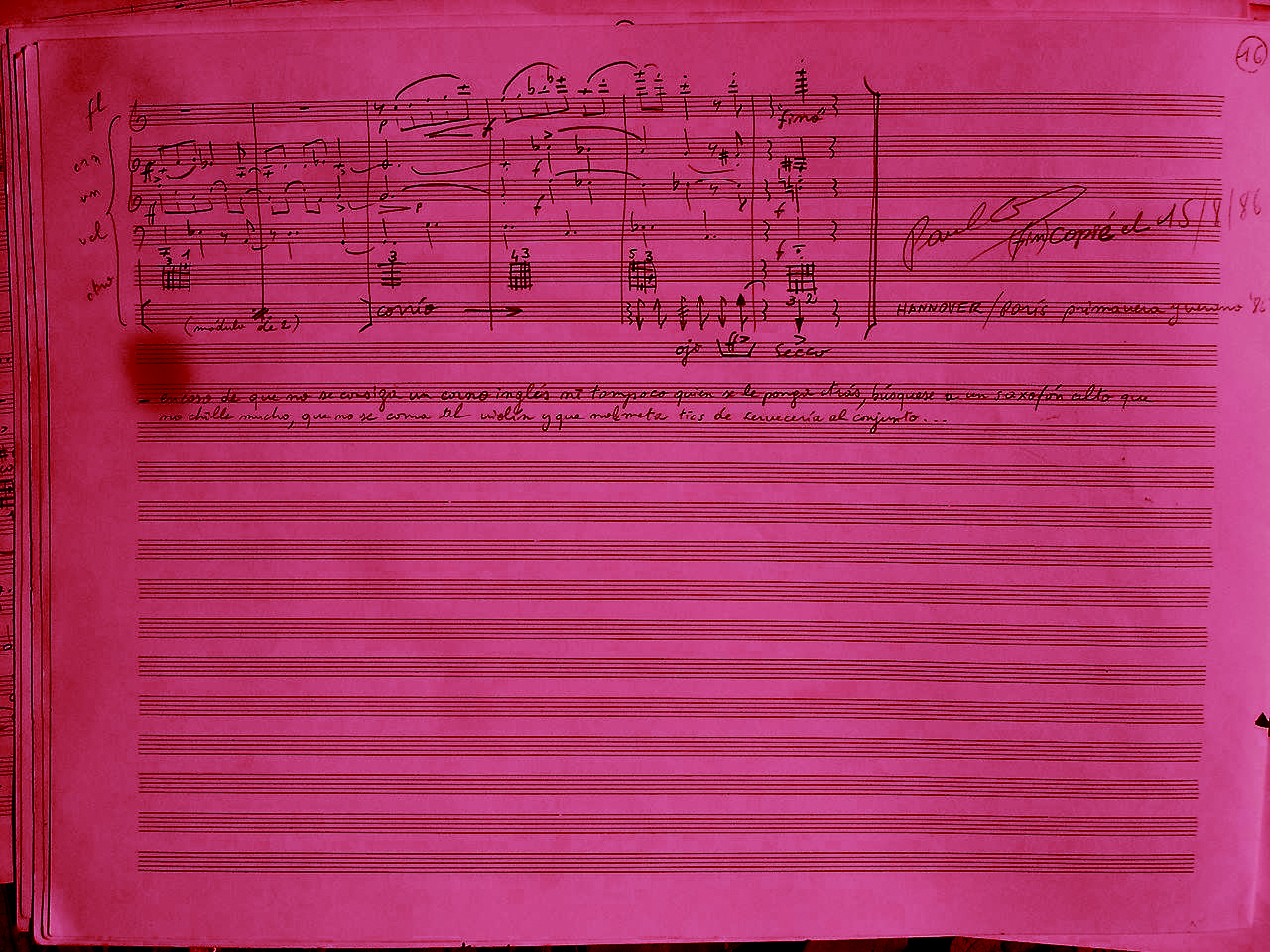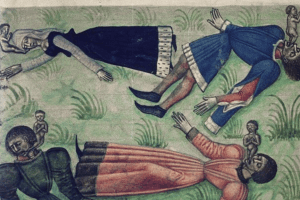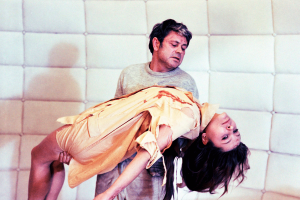Because we are almost ghosts,
we composers appreciate apparitions;
their sincerity is absolute.
P.D.
I
God is an uncontrollable noise. For others, God is silence. But here we are going to talk about Paul. Music recreates prejudice and at the same time devices for survival and for self-destruction, where flesh, innocence, and anguish promote a certain whole. These are prejudices that sustain or destroy a personality while warning of its derisory composition: one is sure to know the pajarillo or the guasa because a trivial nationalism so dictates, until memory (or taste) slips, revealing that to possess an identity is often to awaken to its loss, or at least to recognize that an identity has a promiscuous origin: the work of Paul Desenne is loyal to the sonic passages of this geographical configuration, but also to the insolent and suspicious stare of a man who possesses at least three mother tongues and three origins that decompose him. Fabio Morábito proposed an explanation to this spiritual phenomenon:
«The language here hides
under so many wounds
that to speak is to hurt yourself,
and who speaks best
is who injures most
whoever hides the best.»
II
This cello was born in 1927 in the workshops of J. Aubry, in Le Havre. Its back and ribs are made of maple wood, pine and fir for the table or belly, ebony for the fingerboard, rosewood for the pegs, and braided steel for the strings. The bristles of the bow are made of mare’s tail, whitened by the animal’s urine, while the wood of the bow, like all since the nineteenth century, is Brazil wood. The cello was acquired in 1981 by Venezuelan composer Paul Desenne (Caracas, 1959), the son of a French physician and an American astrologer of Czech origin. Why this instrument? Desenne replies that, as he was once told, all Czech families—as is the case of his maternal family—are given a cellist, perhaps as a result of a spiritual adjustment perpetrated by Antonin Dvorak.
In The Return of the Gods, Pessoa invites us to consider that «the artist is the highest form of the superior man. The saint is of the sort of Angels, whose trade is belief; the sage is of the type of the Archangels, whose trade understanding; the artist, however, is of the sort of the Gods, whose trade is creation.» But we are punchinellos of what came after modernity, and every time the gods are more ephemeral, and they are discarded when they do not satisfy our demands for an absolute love we do not care to correspond. In a polarized country (whatever that means), we divide ourselves between consumers who defend a musical legacy that they ignore, but which they defend fiercely against any possible imperial invasion; while on the other extreme, we wash and scrub a “Venezuelanness” that is only identified with a “21st-Century Socialism” we do not want to account for. Does it make sense, in this context, to be a composer in Venezuela? Does it make sense to write music that harnesses local colors and rhythms? Desenne clarifies: The answer has no geographic specificity. If the taste for composition begins in childhood, as was my case, imagining fantasies in virtual spaces, intimate (as in any form of writing), progressively, due to the structure of the «business» (which is no business), it becomes an almost involuntary, tyrannical exercise: I decide what we are going to play, all must obey the notes. Classical interpreters are, as in Pirandello’s piece, characters in search of an author (and they already have many to choose from); the living composer, as his work and his symphonic appetite grows, becomes an author in search of a multitude. His project must overcome a thousand barriers: the doubt of the programmer, of the director, the reading errors, the restriction of rehearsals, the incomprehension of the public, the rejection of novelty, the strength of customs, the weight of History and its masterpieces. The pertinent question should be: before the indifference of the «music market,» why continue to compose concert music anywhere on the planet?
III
Suite Venezolana [“Venezuelan Suite”] (2006) was composed for a violin virtuoso with a first and a last name: Alexis Cárdenas. Due to astral conjunctions and disagreements of diverse natures, the interpreter has not been able to debut the piece. However, the suite was already presented in various sceneries: there remains the record of at least two stagings on the largest provider of videos online. The piece is divided into four musical regions, four ways of approaching the places we inhabit:
- The Totúnel of Warena
This movement opens the geographical map in the prefiguration of a ghost town, the irony of being a satellite of urbanity. Based on El totumo de Guarenas and the schizophrenic sense of humor of the golpe tuyero, these first minutes recreate a journey where the interpreter must overcome obstacles of life and death: overturned trucks, protests, potholes and perpetual traffic, as in a pre-modern video game running between the cities of Caracas and Guarenas. The tunnel between civilization and ghost town (but which end is which?) recalls permanent but never exhaustive attempts to reach the future. This proclivity to a frolicsome and frivolous sense of humor, to look suspiciously at any attempt at solemnity, is related to the figure of The Emperor, concerned with winning an egocentric battle or waging a battle of independence against the imaginary enemy he uses to justify his incapacity to effectively manage the strata of the real. Urban life, or rather, life under the seal of a cardboard urbanity, teaches us to combat and manage the appearance of the opposites of the moment. «Living with strangers requires mastering the art of disagreement, which relegates the others to the background, but does not make them disappear,» says Enrique González Duro in Biografía del miedo. The emperor has moderated his conquest of space: he does not shoot or destroy villages, but he becomes indifferent and frivolous, except when others serve him as subjects. There is something in his laughter, in the violin and piano monologues, that suggests a false armistice, a mutual denial beneath the tropical grace.
- Donzulián
Inspired by Pablo Camacaro’s Señor Jou , this Zulian danza is proposed as an anticipated attempt of solemnity, even opposing the hyperbolic lifestyle of the Western region of the country [where the Zulia state is located]. Señor Jou is a man of sad manners who reflects upon the landscape and its offspring. Enters The High Priest: owner of a brief emotional chaos, the waltz generates a fracture because it derives in an unexpected and melancholic reflection in its romantic ways. The semantic modulations of the piece require the listener to re-read the dominant patriarchal style. «In most cases, it is not enough to know the origin myth, it is necessary to recite it; it is proclaimed in some way, it is shown,» sentences Mircea Eliade. Why? We constantly narrate a military feat with omnipresent father figures categorized as deities: Bolívar, Guaicaipuro, Yoraco, any component of María Lionza’s thug court. We need to justify, at every bite, a bloody origin that makes us proud while at the same time rejects us, as if by the mere act of narrating, showing the origin, we regained an empire of senses and privileges in which we have never really participated. Donzulián is included in this game, opposing the spirit of The Emperor while offering an alternative to the caudillo Father who makes our genitals soften: here is a slow and elegant old man, secretly proud and fanatical in his intellectual pursuits, like a civilizing waltz. An old horse that no longer fools anyone with a pretend virility, and who rejoices in the pedagogical contemplation of the future generations whom he intends to inherit a second vision of his fatherhood: a kind patriarch, «revealer of sacred things.»
- Guasa of the tin monochord
But how long might the armistice between two ends of the same line last? What kind of children are we? There remains a fate between these two speculations that offers us time and land to establish our origin: madness. Desenne refers to an anecdote that marks the genesis of this third movement: far away, by the end of the seventh decade of the last century, the young composer stumbled in Sabana Grande with a dirty and stinking madman who dragged a monochord composed of a can of vegetable oil, a stick, a piece of wire, and a bottle. He was accompanied by another loony type, both harmless and splendid, like sketches of a failed social enterprise—despite the fact that, in elementary school, the teacher assured us that Venezuela was a developing country. The archetypal madman arrives to describe a trait of our psyche: we need a bad father to justify our inclination towards caustic narcissistic innocence, detachment, and rejection of solemnity. «It seems like in Venezuela we’ve only had the effective history of power, and this is reduced to the management duties of the State. The curious thing is that this State, magnified by historians, appears in its purest condition of aerial entity, superimposed to a fiction called the people. The State is the almighty and nearly sole institution that to this day dominates the dynamics of society. It safeguards or annihilates community assets, draws frontiers, and provides for the plans for the rearrangement of public and private life,» notes sociologist Miguel Ángel Campos. Thus, the picture does not look beneficial to the armistice proposed for surviving our origin. But what is the true nature of the act of being saved? The father State allows us the rebellion of thoughtlessness because it mistreats us and we show ourselves incapable of demanding that it take charge of the affective control. The struggle between the emperor-soldier—frivolous and autocratic—and the wise old man—contemplative and proud—(let’s not talk about Rafael Caldera placing the presidential band on Hugo Chávez), is, in a way, the projection of an unprecedented orphanage from which the spectator does not know how (does not want) to recover. Faced with the acknowledgment of a spiritual debacle, and facing an inevitably finite destiny, madness remains a spiritual crutch. Perhaps, retaining some virtue or another, as Adorno would have written about Mahler: «[Music] does not confuse the world, which it names as its equal, nor are its categories the disconnected ones of the mere subject: they remain directed at those of the world. If the latter were directly equated to being—and, as understood by Schopenhauer, it is music that is immediate being—music would be madness. All great music is snatched from madness…»
- His pajarillo
Mutant and diabolical: such is the last movement, which demands the most proof of virtuosity in the handling of the strings. A malicious beauty returns an indifferent but devouring look. The devil of the arcana combines a predisposition to the generative instinct of aesthetic realities and the reception of tellurian passions—passions that accept no discourse but act. The price to pay for acquiring creative realities is to merge with the pride of an inhospitable possession, in a voracious dialogue between both soloists—a contrapunteo [improvised verse duel] that recalls a dialectical combat in which Desenne himself has had important participation: Florentino y el Diablo [«Florentino and the Devil»]. In 2004, he wrote his adaptation of El reto [«The Duel»], which contradicts and at the same time justifies the diabolical presence in both compositions: I do not know the range of reactions aroused by El reto. Many were good, but I doubt that the mere musical structure was the only thing at stake; there is always a political reading, or one guided by aesthetic prejudices. I wanted the Devil’s entrance into de the duel to be lascivious, devilishly mutant; instead of using the frenetic «Pajarillo» that blows curtains open, I invented a free structure that oscillates between «golpes de seis» and «guarachas,» a sort of lowland cabaret or brothel. The devil is the devil. The essence of my version of Arvelo’s work is freedom: to employ the entire orchestral and stylistic palette to accomplish a Venezuelan opera, with introductory symphony and all—a fundamental piece of the dramatic structure. I repeat what I have said on occasion: this is not folklore, this is not «indigenous music» nor a compilation of it: it is a fiction, composed within the languages of our hybrid musical culture. I refer to Borges’ texts on gauchesque literature.
IV
The devil is in the details. Meanwhile, on Twitter, Desenne goes on about how the world has only forty more years to live. Once they tried to steal his cello, but luckily he saw it descending the stairs alone, as the thief crouched with the instrument on his back.
*About the author:
Enza García Arreaza (Puerto la Cruz, 1987) is an editor at Backroom Caracas, writer, and poet. She obtained the VII Cuento Contigo Literary Prize bestowed by Casa de América (Madrid, 2004) with «La parte que le tocó a Caleb». In 2007, she won the prize for unpublished authors hosted by Monte Ávila Editores with the book of short stories Cállate poco a poco (Monte Ávila Editores, 2008). In 2009, she received the III National University Literature Prize, hosted by Universidad Simón Bolívar, with the book El bosque de los abedules (Equinoccio, 2010). Her writing appears in the anthologies Cuento Contigo 2 (Madrid, Siruela, 2006), and Zgodbe iz Venezuele (Eslovenia, Sodobnost International, 2009); in the collections De la urbe para el orbe. Nueva narrativa urbana (Caracas, Alfadil, 2006); Joven Narrativa Venezolana III. Premio de Cuento Policlínica Metropolitana para Jóvenes Autores 2009-2010 (Caracas, Equinoccio, 2011); De qué va el cuento. Antología del relato venezolano 2000-2012 (Caracas, Alfaguara, 2013); Tiempos de nostalgia / Tiempos de saudade (Caracas, Ediciones del Instituto Cultural Brasil–Venezuela, 2013), and in Voces -30. Nueva narrativa latinoamericana (Chile, Ebookspatagonia, 2014). The book of short stories Plegarias para un zorro was published in 2012 by bid & co. editor. El animal intacto, her first poetry book, was published in 2015 by Ediciones Isla de libros.


















